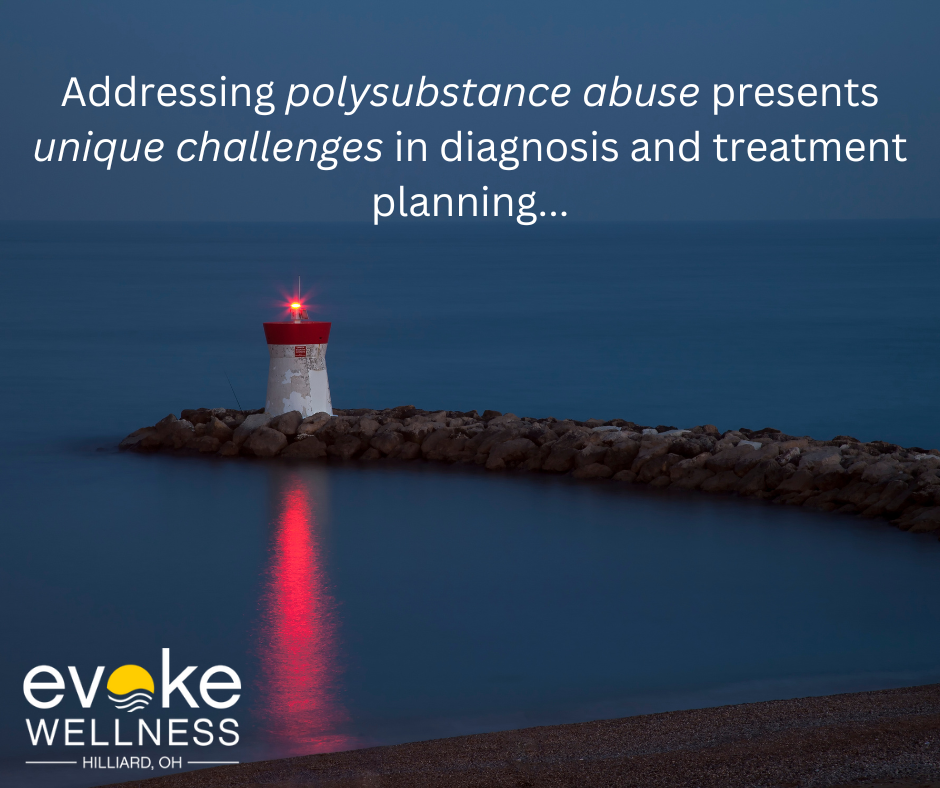Are you or a loved one struggling with polysubstance abuse? The road to recovery can seem daunting, but you’re not alone. Polysubstance abuse—the use of multiple drugs simultaneously—presents unique challenges that require a specialized approach to treatment. In this article, we’ll explore the complexities of detoxing from multiple substances and outline effective strategies for your recovery journey. You’ll learn about:
- The importance of medical detox
- Tailored treatment plans for polysubstance abuse
- Holistic approaches to healing
By understanding these key components, you’ll be better equipped to tackle the hurdles of polysubstance recovery and pave the way for lasting sobriety.
Call us at (833) 949-1347 today or reach out online.
Understanding Polysubstance Abuse
What Is It?
Polysubstance abuse refers to the dangerous practice of consuming multiple mind-altering substances, such as alcohol, prescription medications, and illegal drugs. This type of substance use disorder often stems from an attempt to intensify the desired effects or counteract the adverse side effects of one substance with another.
Widespread Impact
Polysubstance abuse is alarmingly prevalent, affecting individuals across all demographics and socioeconomic backgrounds. Its consequences can be devastating, leading to:
- Increased risk of overdose
- Severe physical and mental health issues
- Strained relationships and social isolation
Complex Recovery
Overcoming polysubstance addiction requires a multifaceted approach that addresses the unique challenges posed by multiple substance dependencies. Effective treatment often involves:
- Medical detox to safely manage withdrawal symptoms
- Integrated therapy addressing underlying issues
- Long-term support and relapse prevention strategies
The Complexities of Polysubstance Abuse Treatment
Addressing polysubstance abuse presents unique challenges in diagnosis and treatment planning. Multiple substance dependencies intertwine, compounding withdrawal symptoms and cravings.
Comprehensive Evaluation
- Detailed substance use history
- Concurrent mental health screenings
- Metabolic and medical testing
Integrated Treatment Plan
- Concurrent treatment modalities
- Medication-assisted detox
- Behavioral therapies (CBT, contingency management)
Continuum of Care
- Inpatient or residential rehab
- Intensive outpatient programs
- Community-based support services
Polysubstance abuse treatment demands a holistic, individualized approach. Ongoing coordination between medical and behavioral health providers is crucial for sustained recovery.
Medical Detox for Polysubstance Abuse
The first step in your recovery journey is medical detox – a crucial process that safely manages withdrawal symptoms. With polysubstance abuse, detox becomes even more complex due to the interactions between multiple substances.
Safe and Supervised Withdrawal
- Medications to ease cravings and discomfort
- Round-the-clock monitoring by medical professionals
- Nutritional support to replenish deficiencies
Customized Detox Protocol
Each person’s detox needs are unique, tailored to their specific substance use history. An individualized treatment plan ensures the safest, most effective path through this challenging phase.
Stabilization for Ongoing Treatment
Detox alone isn’t enough – it prepares your mind and body for comprehensive therapy. Once stabilized, you’ll continue addressing the physical, psychological, and social roots of addiction.
Comprehensive Treatment Approaches
Integrated Therapies
A multidisciplinary approach integrates evidence-based psychotherapies and pharmacological interventions tailored to your unique circumstances. Cognitive-behavioral therapy, motivational interviewing, and contingency management are proven effective.
Holistic Healing
Comprehensive treatment addresses underlying mental health issues and trauma through holistic mind-body practices. Mindfulness, art therapy, nutrition counseling, and exercise promote overall wellbeing.
Medical Detox
For severe or prolonged substance use, medically supervised detox manages withdrawal symptoms safely. Medications ease cravings and stabilize brain chemistry during this crucial first step.
Medications for Polysubstance Abuse Treatment
Medication-Assisted Treatment
Medication-assisted treatment (MAT) combines behavioral therapy and FDA-approved medications to treat substance use disorders. For polysubstance abuse, tailored MAT plans may help:
- Reduce cravings and withdrawal symptoms
- Block effects of substances
- Normalize brain chemistry disrupted by substance abuse
Common MAT Medications
- Methadone, buprenorphine (opioid agonists)
- Naltrexone (opioid antagonist)
- Disulfiram (alcohol aversion)
- Acamprosate (reduces alcohol craving)
Inpatient Medical Detox
For severe polysubstance dependence, inpatient medical detox provides 24/7 monitoring as substances clear the body. Medications manage withdrawal symptoms while counseling and support prepare for ongoing outpatient treatment.
Aftercare and Relapse Prevention
Long-Term Support Systems
Building a robust support network is crucial for sustained recovery. Surround yourself with understanding individuals who encourage your sobriety journey. Consider joining peer support groups or engaging a counselor for ongoing guidance.
Relapse Prevention Strategies
- Identify personal triggers and develop coping mechanisms to manage cravings or high-risk situations.
- Practice stress management techniques like meditation, exercise, or journaling.
- Maintain a structured routine with healthy habits to minimize idle time.
- Celebrate milestones and self-care to reinforce your commitment to sobriety.
Relapse is a potential setback, but with the right aftercare plan and determination, you can regain control and continue progressing on your recovery path. Prioritize your well-being and reach out for professional help when needed.
Polysubstance Abuse Treatment: Frequently Asked Questions
How is Polysubstance Abuse Treated?
- Medical detox to manage withdrawal symptoms
- Inpatient or outpatient rehab programs
- Behavioral therapies (CBT, contingency management)
- Medication-assisted treatment for opioid, alcohol use disorders
- Holistic therapies (exercise, mindfulness, nutrition coaching)
What’s the Most Effective Substance Abuse Treatment?
Polysubstance abuse treatment must be comprehensive – addressing all substances used. The most effective approach combines:
- Medication to curb cravings, ease withdrawal
- Evidence-based behavioral therapies
- Supportive counseling and peer support
- Lifestyle changes for sustained recovery
Treating co-occurring mental health issues is also crucial. With commitment, an individualized treatment plan can help regain sobriety.
Conclusion
As you embark on your journey to overcome polysubstance abuse, remember that recovery is possible with the right approach and support. By understanding the complexities of your unique situation and embracing a comprehensive treatment plan, you can navigate the challenges of detox and rehabilitation successfully.
Key takeaways:
- Medical detox is crucial for safe withdrawal
- Personalized treatment addresses multiple substance dependencies
- Ongoing support is essential for long-term recovery
Your path to healing may be complex, but with professional guidance and a commitment to your well-being, you can overcome polysubstance abuse. Take the first step today towards reclaiming your life and building a healthier, substance-free future. Remember, you’re not alone in this journey – reach out and start your comprehensive recovery process now.
Begin Your Journey with Evoke Wellness at Hilliard
If you or a loved one is considering treatment, Evoke Wellness at Hilliard invites you to contact us. Our compassionate team is ready to answer your questions, discuss your needs, and help you take the first steps toward recovery. In Hilliard, you’ll find more than just a treatment program – you’ll discover a community dedicated to your wellness and success. Together, let’s embrace the journey to recovery and the promise of a new beginning. Call us at (833) 949-1347 today or reach out online.



